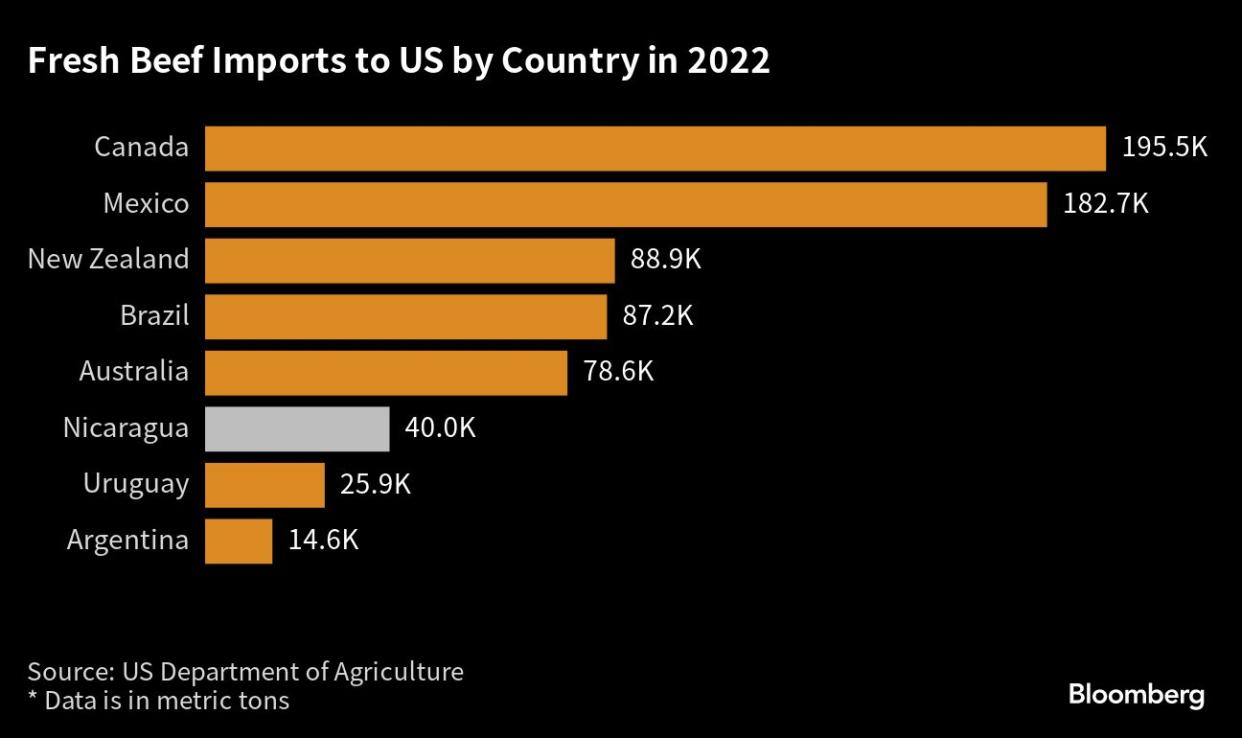Key Beef Supplier to the US Has a Dirty Secret, Film Says

(Bloomberg) -- Nicaragua’s beef industry is under fresh scrutiny with a documentary backed by actor Leonardo DiCaprio’s foundation, which claims that ranchers there are illegally decimating rainforests to raise cattle for meat that ends up in US supermarkets.
Most Read from Bloomberg
America’s Fastest Growing City Is Embracing ‘Yellowstone’ Mania
Goldman Pencils In First Fed Rate Cut for Second Quarter of 2024
The Fed Is Playing a Waiting Game to Try to Avoid a Recession
PATROL, funded in part by DiCaprio’s nonprofit Re:wild, follows a campaign by the Rama indigenous group and the Kriol, who are of African descent, to halt ranching in the Indio Maíz Biological Reserve. In the past decade, more than 70 community members have been killed and thousands displaced as the ranchers flout laws recognizing indigenous land rights, according to the filmmakers.
Concerns about so-called conflict beef have plagued the global market. While the US exports about $12 billion of beef per year, the country also buys from countries including Nicaragua and Brazil. Nicaragua — the sixth-largest foreign exporter of fresh beef to the US last year — pledged in 2020 to monitor its cattle suppliers amid reports that ranchers were trampling on indigenous rights and hastening deforestation.
Nicaragua’s IPSA, the agency responsible for regulating farms and ranches, didn’t respond to requests for comment.
“We were trying to understand how the system facilitates this process of colonization and deforestation that in Nicaragua is happening at a faster rate than in any other country in Central America,” said Camilo de Castro Belli, a Nicaraguan who directed PATROL with American Brad Allgood.
View this post on Instagram
A post shared by Leonardo DiCaprio (@leonardodicaprio)
US involvement in the issue is contradictory, according to Chris Jordan, Re:wild’s Latin America director. The government has issued sanctions against Nicaraguan President Daniel Ortega’s regime, alleging human rights violations, while US companies spend millions of dollars a year on Nicaraguan beef, he said. The US continually evaluates “how best to use the tools at our disposal” against abuses committed by the Ortega regime, a State Department spokesperson said. “Governments that deny individual human rights or threaten the security interests of their neighbors should not expect their political and economic relationships with the United States to remain unaffected.”
A bill introduced in 2021 to prohibit imports into the US of products made on illegally deforested lands hasn’t become law. Between 2019 and 2021, Nicaragua exported an estimated 91% of its beef production, with 49% of its shipments destined for the US, government data show.
The destruction of Indio Maíz dates back to around 2011 and more should be done to protect indigenous lands and livelihoods, said Amaru Ruiz, a Nicaraguan environmental activist who has been living in exile after receiving threats and attacks on his home.
“For these communities, the forest is their refuge, it is their home,” Ruiz said. “It is where they get the food, the resources to survive.”
Illegal cattle ranching is a hard-to-tackle issue because of the lack of transparency and the significance that beef, one of Nicaragua’s top exports, has to the economy, according to Enrique Sáenz, an economist and former member of the country’s national assembly.
Though law enforcement officials are aware that illegal ranching occurs, they rarely make arrests, de Castro said. Cattle ranchers seize indigenous lands — often violently — to expand their pastures and feed livestock, he said.
“Government officials are willing to bend the rules very often in exchange for money or because they are dealing with people who have power,” he said.
Most Read from Bloomberg Businessweek
©2023 Bloomberg L.P.


